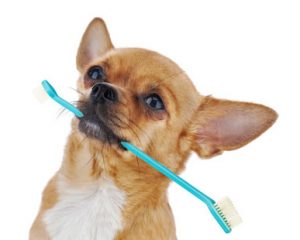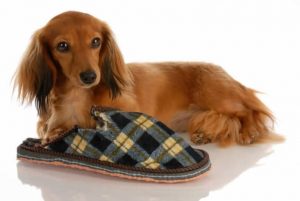Meadows Dog Health Advice
New Puppy Top Tips
 • The first night in its new home is usually the most stressful night for any breed. Make it as comforting as possible with a ticking clock wrapped in its blanket or leave the radio on to soothe it to sleep.
• The first night in its new home is usually the most stressful night for any breed. Make it as comforting as possible with a ticking clock wrapped in its blanket or leave the radio on to soothe it to sleep.
• Choose washable bedding.
• Confine your puppy to a section of the house so that you have control over its toilet training.
• Make sure kitchen rubbish is out of reach as are any other visible dangers such as large houseplants or pots.
• Some clients prefer to bring their new pup in a pet carrier to the vet. They feel safer in the car when they are very young and they are not exposed to any sick animals in the waiting room.
• Choose enough toys so that your furniture remains untouched by tiny teeth. Be careful not to give them toys that look like the items you want them to avoid chewing such as a shoe. Balls and knotted ropes are good but avoid games that encourage your puppy to fight with you and that makes it growl.
• If your puppy continuously tries to chew your hands, discourage it by squeaking to give it a fright and distract it. Make a fist to hide your fingers and hide your hands if it perseveres. If encouraged you may end up with a biting dog.
• Your pup can be fitted with a collar from when he is very little. It should fit snugly but allow for 1 – 2 fingers width of space between collar and neck. Loosen the collar as he grows.
• Choose a good quality food that you want to keep him on.
• Dry foods tend to be better for their teeth – especially in the smaller breeds that live longer and can suffer with dental disease if they only eat a soft food diet. Puppies have a tiny stomach so divide their feeds up into 4 meals initially.
• Always provide fresh water.
• Large breed puppies should be fed a puppy food specially designed for large breed dogs. They can grow too quickly on a normal high protein puppy food and suffer with joint disease. The large breed puppy foods balance the ratio of protein and carbohydrate so that your pet does not grow too fast.
• Start training your puppy at an early age to build up a good relationship with your new companion.
• Make sure they are wormed too with their first vaccination if the breeder has not already done so as most puppies will have worms from their mothers.
• Any sign of fleas will need treatment too by us.
• Start basic discipline which involves being consistent with what you say and do. Be patient as dogs have short memories.
• Correct your puppy when his behaviour is inappropriate but lavish him with praise as a positive reinforcement when it is right. Never resort to physical punishment.
• Once vaccinated, you can start to socialise your pup but do not overdo the exercise. Your puppy will probably love being out and want to go for a lot further than it should. Over-exercising at a young age could adversely affect his growth especially in the larger breed dogs.
• Puppies need to know their place in the pecking order at home. They will be much happier, better adjusted pets if you can follow the following simple guidelines, designed to mimic the wolf pack principle of “the top dog (the alpha male) goes first, feeds first, and leads”. Feed your pup after you have eaten.
Most of all, enjoy your time with your new pet and we are here if you need us.
Transition from MSD Nobivac L2 to L4 :
 MSD Animal Health made the decision to discontinue Nobivac Lepto 2 in response to reviewing the updated World Small Animal Veterinary Association Vaccination Guidelines. These guidelines recommend the use of vaccines that include the strains of leptospirosis that are known to cause disease in different countries.
MSD Animal Health made the decision to discontinue Nobivac Lepto 2 in response to reviewing the updated World Small Animal Veterinary Association Vaccination Guidelines. These guidelines recommend the use of vaccines that include the strains of leptospirosis that are known to cause disease in different countries.
In the UK there is an additional strain ( called Bratislava ) that is covered by Nobivac L4, but not Nobivac Lepto 2.
Dogs that have not been vaccinated with L4 previously will need 2 vaccinations 4 weeks apart.
Good dental care is very important in your dog as plaque can harbour bacteria that can enter the bloodstream and affect other important organs such as the kidneys and the heart.
It is well known that plaque can begin to build up on the surfaces of the teeth very quickly in most breeds but especially in the smaller dogs, and that tooth brushing, in conjunction with other measures, is the most effective way of minimising this accumulation.
 Pets should be introduced to brushing slowly, using a soft pet toothbrush and specially formulated toothpaste.
Pets should be introduced to brushing slowly, using a soft pet toothbrush and specially formulated toothpaste.
The toothbrush should be used in small gentle circular movements in the area where the tooth meets the gum.
It is known that plaque can start to build up on the tooth surfaces very quickly even after a dental has been performed, and tooth brushing is the most effective way of minimising the accumulation of dental deposits.
Pets should be introduced to this process slowly, using a soft toothbrush, and toothpaste formulated especially for pets.
The toothbrush should be used in a gentle circular motion around the area where the tooth meets the gum. To supplement home dental care regimes, there are specialised veterinary diets, chews, pastes, gels and granules available to buy from us, all of which help to decrease the accumulation of plaque on the teeth.
Good Dental Care means:
- Have your pets’ teeth properly cleaned
- Feed dry food exclusively – no tinned or other processed foods and no adding water to dry food
- Provide specific dental chews but not too often as these can cause weight gain
- Brush regularly if possible
- Check your pets’ teeth on a weekly basis
Set rules when your puppy is young and stick to them. • Avoid situations that promote inappropriate behaviour.
• Avoid situations that promote inappropriate behaviour.
• Observe your pet and provide what it needs to be cared for and attended to.
• Supervise your new pet diligently through undivided individual attention and training. Restrict your pet’s access to a limited area of the house until training is complete.
• Encourage good behaviour with lavish praise and attention.
• Correct bad behaviours by providing positive alternatives. (e.g. a toy for a slipper, a scratching post for a sofa).
• Never physically punish or force compliance to commands. This may lead to fear biting or aggression.
• Don’t play roughly or encourage aggression or play biting.
• Expose pets to people, animals and environments where you want them to live.
• Ask to see any of our vets or nurses if serious or unresolved behavioural problems exist.
We work closely with Pet Behavioural Specialists and can refer cases if required.
Most of the objections put forward against neutering are unfounded worries. If you have any questions please do not hesitate to speak to one of our Meadows Vets team.

Male dogs can be neutered from 6 months to:
• Stop or reduce male sex-hormone driven behaviours
• Reduce wandering/roaming/straying (also reducing car accidents)
• Reduce the chances of a dog bite
• Reduce aggression towards other dogs
• Reduce territoriality
• Reduce prostatic disease (something very common in older entire male dogs)
• Remove the risk of testicular cancer (especially common in retained testicles)
For the large breed dogs we would advise neutering once skeletal maturity is reached.
Bitches should be neutered from 6 months or, if they have had a season then 2 – 3 months after a season or 2 – 3 months after a false pregnancy.
Early neutering will:
• Dramatically reduce (by 70%) the risk of mammary cancer.
• Stop unwanted heats/seasons – the inconvenience of three weeks of bleeding and attractiveness to male dogs. Bitches in season have been known to scale metre high fences to get out.
• Reduce the risk of false pregnancies, a very common and distressing condition.
• Remove the risk of a pyometra – a life-threatening womb infection very common in older or middle- aged entire bitches.
• Reduce the number of unwanted puppies
• Increase the likelihood of obesity – it is important that neutered bitches are fed slightly less (approx. 10%) than entire bitches. Their weight is in your hands and they will only get fat if they are overfed.
• Increase the chances of a urinary leakage problem – this can occur in entire bitches too, and can be managed by drops.
A regular flea prevention and worming routine is important in keeping your pet fit and healthy. Your pet can encounter worms and skin parasites anywhere out on a walk where other animals have been or even in your own garden.
What worms are out there?
There are many different types of worms that can infect your dog in the UK or if your pet travels abroad with you.
The main species in the UK are roundworm, tapeworm, whipworm, hookworm, heartworm and lungworm. Some of these can be potentially harmful to humans as well, namely roundworm and tapeworm.
How does my pet get worms?
Most transmission of worms is where the eggs or larvae are shed in the faeces of infected animals and are ingested by your pet as they graze or snuffle in the grass.
Once inside the pet, these mature into adult worms, which shed more eggs, and so the cycle continues. Worm eggs can also be brought into the house on shoes and transmission of some worms is via an intermediate host such as snails or fleas so indoor pets can be affected too.
What skin parasites should I be concerned about?
Dogs can be affected by a number of skin parasites including fleas, lice, mites that live on the skin or in ears and ticks. These can be contracted from other affected pets, from wildlife ie foxes, or from the environment (this includes your home if one of your pets has brought in fleas!).
Signs can include itching (but not in all cases), hair loss, head shaking, reddening of the skin or even sightings of the parasites on your pet.
Speak to us to advise you on the best course of treatment for your pet.
Occasionally we need blood transfusions for patients with severe anaemia. If you think your dog could be a canine life saver and fits the following criteria, please contact the surgery
Donor Criteria :
* aged 1-8 years old
* weighs 20kg or more
* up to date with vaccinations
* good temperament
* fit, healthy and not on any medications
* never travelled abroad
We could require your dog at short notice, day or night! Your dogs own blood would initially be analysed to check red and white blood cell count. All being well your dog would need to be sedated for us to collect the donation of roughly 500-750ml of blood. There is no cost to yourself.
In the UK we are a nation of pet lovers who rightly take the responsibility of pet ownership very seriously.
No one wants to see their pet suffer due to injury or illness, beyond a point where quality of life is no longer possible. Thus, the option of euthanasia becomes a consideration.
Euthanasia literally means ‘good death’ and can only be administered by a registered veterinary surgeon. As a result, vets are directly involved in the decision process.
Once the difficult decision is made, we will work with you to find the right time. We will facilitate booking a quiet time at the surgery or can carry out the procedure in the familiar environment of your own home.
As animal lovers ourselves we understand the significant feelings of loss when a pet finally passes away. Hopefully you will find us professional yet able to offer comfort and reassurance during this difficult time.
